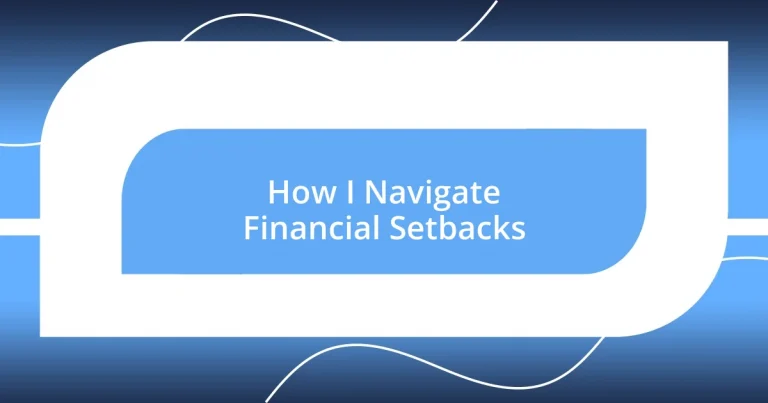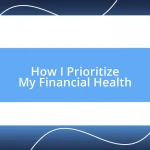Key takeaways:
- Financial setbacks are common and can arise from unexpected events, emphasizing the need to understand their root causes and reflect on personal financial habits.
- Creating a realistic budget by assessing fixed and variable expenses, setting aside savings, and regularly reevaluating can help regain control over finances.
- Maintaining a positive mindset through gratitude, seeking professional financial advice, and building a supportive network can significantly impact recovery and overall financial health.
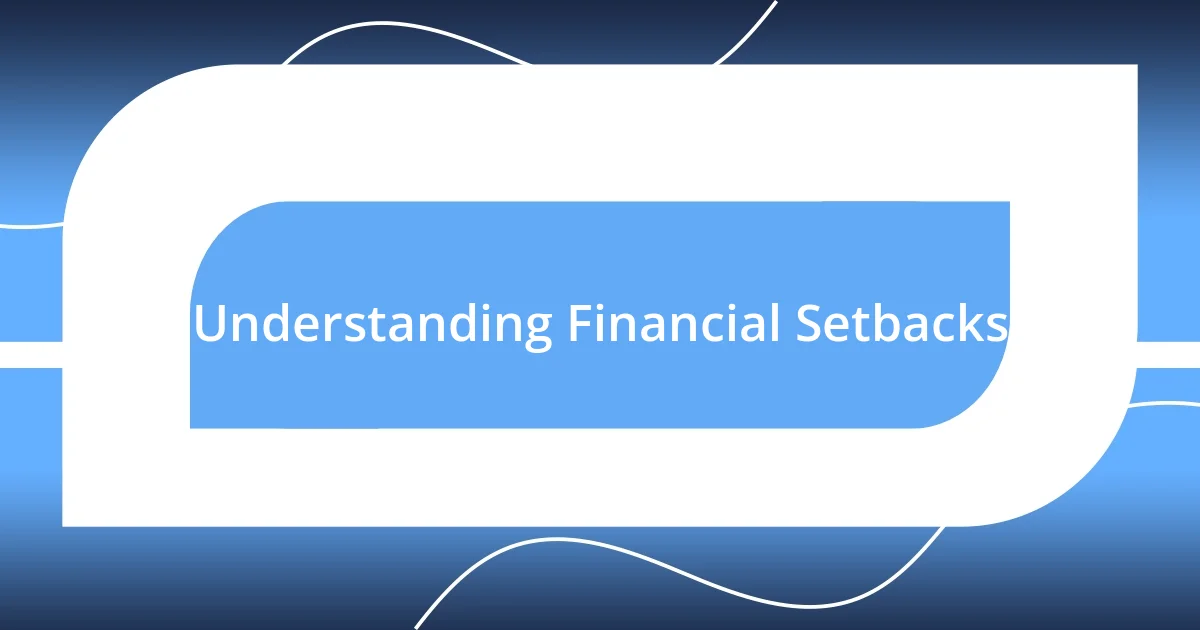
Understanding Financial Setbacks
Financial setbacks can hit us unexpectedly, like a freight train barreling down the tracks. I remember the time I faced an unanticipated job loss—suddenly, my financial stability seemed to vanish overnight. Have you ever felt that gut-wrenching moment when reality hits, and you realize you need to rethink everything?
Understanding that financial setbacks are common is crucial. They can stem from various sources—medical emergencies, economic downturns, or even poor planning. Personally, I’ve experienced how even a small, unplanned expense can snowball, pushing one’s budget into a tailspin. I’m curious, how have these experiences shaped your view on financial security?
What often makes these setbacks emotional isn’t just about the money; it’s about the fear of losing control over our lives. I recall feeling overwhelmed by anxiety as I mulled over my dwindling savings—it was more than just dollars and cents; it felt like my dreams were slipping away. How do we navigate those feelings while trying to sort through the practicalities of recovery?
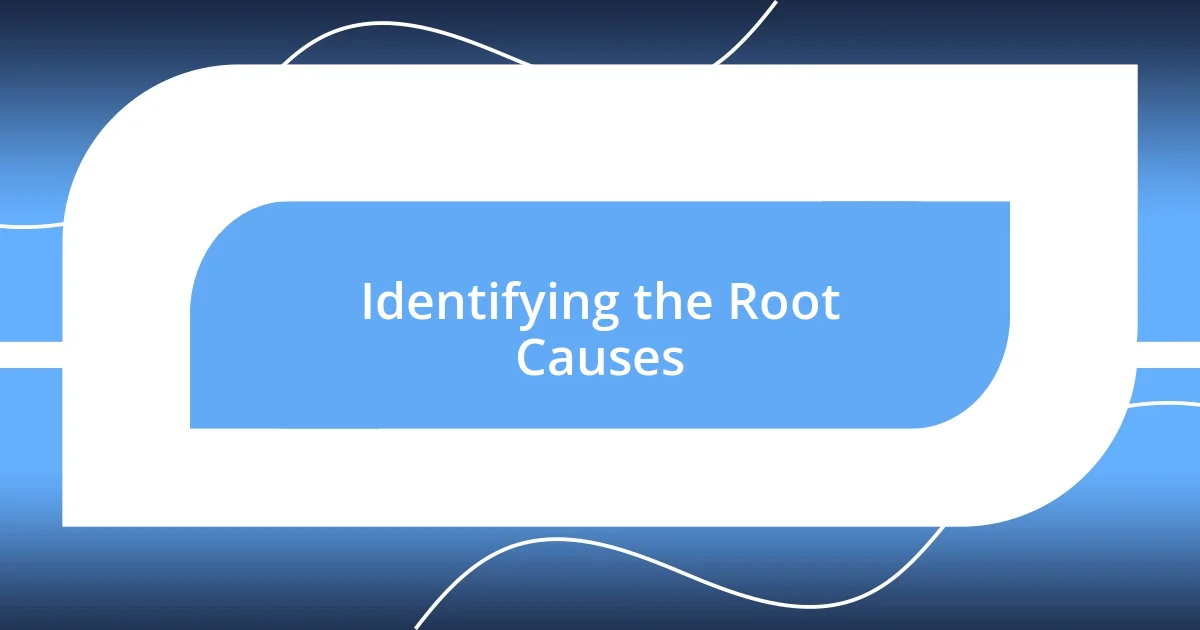
Identifying the Root Causes
Identifying the root causes of financial setbacks is the first step in regaining control. For me, it was essential to take a step back and reflect on what exactly went wrong. In my case, it was a combination of unexpected medical bills and my tendency to underestimate monthly expenses. Have you ever realized that smaller factors can accumulate to create a larger problem?
Often, we don’t see the warning signs until it’s too late. I learned the hard way how failing to track my spending contributed to my setbacks. When I began keeping a detailed account of my expenses, everything became clearer. This simple practice not only helped in identifying bad spending habits but also revealed how easily I could adjust my budget to avert future crises. What have you discovered about your habits in times of financial stress?
It’s a learning process—one filled with moments of discomfort and realization. I remember sitting down with my financial records, feeling both embarrassed and motivated. Recognizing the root causes behind my financial issues eventually led to proactive changes, empowering me to take charge of my future. How do you plan to harness your insights for better financial health?
| Potential Causes | Personal Reflection |
|---|---|
| Unexpected Expenses | I recall how a sudden car repair cost threw off my entire budget for the month. |
| Poor Financial Planning | My lack of a solid plan led to frequent overdrafts and unnecessary fees, which added to my stress. |
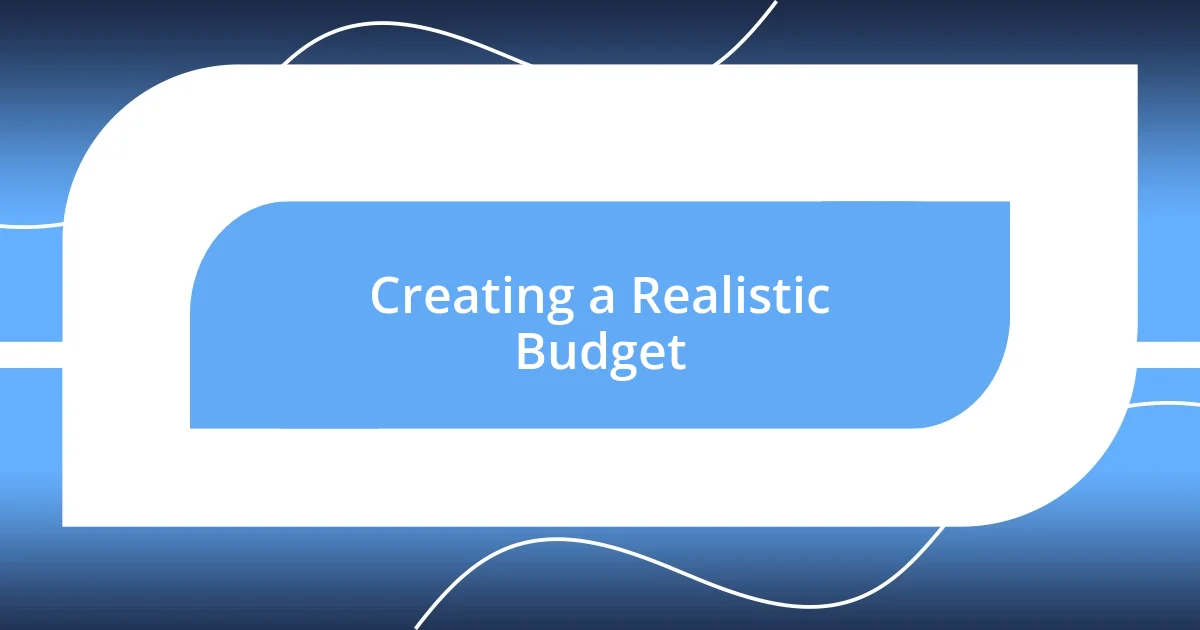
Creating a Realistic Budget
Creating a budget that feels realistic can sometimes feel overwhelming, especially after facing financial setbacks. From my experience, the key is to start with what I know: my fixed expenses. When I began my budget journey, I listed out my essentials—rent, utilities, groceries—without overthinking anything else. It was like peeling an onion; each layer revealed what I truly needed versus what I wanted. Have you ever felt that liberation when you finally see your necessary expenses laid out?
To craft a realistic budget, I found it helpful to follow a few essential guidelines:
-
Assess monthly income: First, calculate all sources of income to understand what you’re working with.
-
List fixed and variable expenses: Segment them into essential bills and discretionary spending. This clarity can reveal areas to trim.
-
Set aside savings: Treat savings like a fixed expense. I always try to put a little aside each month, even if it’s a small amount.
-
Reevaluate regularly: Life changes, and so should your budget. I make it a point to review my budget every month; it keeps me aligned with my financial goals.
-
Be realistic: Avoid overstretching your budget with rigid numbers; include some room for unexpected expenses. The first time I learned this, I added a line for ‘fun money,’ and it made all the difference.
Creating this roadmap gave me the assurance I needed. It wasn’t just about numbers on a page; it was about regaining control of my financial journey, one step at a time. How do you think a well-structured budget could change your current perspective on spending?
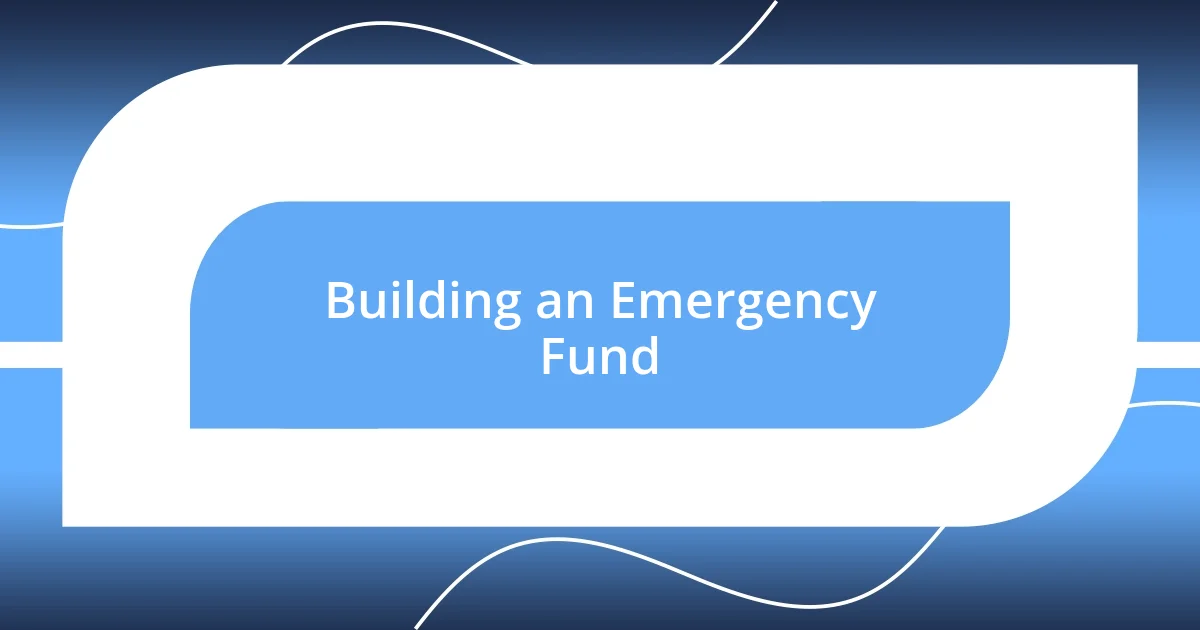
Building an Emergency Fund
Building an emergency fund is a crucial step in navigating financial setbacks. I remember when I first realized the importance of this safety net; it was after an unexpected job loss. The anxiety of not having immediate funds to cover my bills was a wake-up call. Have you ever felt that tight knot in your stomach when you think about your finances? Creating an emergency fund can help alleviate some of that worry.
In my process of building an emergency fund, I started small. I decided to save just $25 from each paycheck; it seemed manageable and didn’t disrupt my budget too much. Over time, those small contributions added up. It amazed me how consistency can lead to significant savings. Have you tried setting aside even a nominal amount each week or month? You might be surprised at how quickly it grows.
I also learned to prioritize this fund over other non-essential spending. Sacrificing a few takeout dinners made a big difference over months. The peace of mind that came from knowing I had a cushion—enough to cover three months of living expenses—was incredible. I often encourage my friends to think about what they could cut back on to secure their future. What shifts could you make today to start your own emergency fund journey?
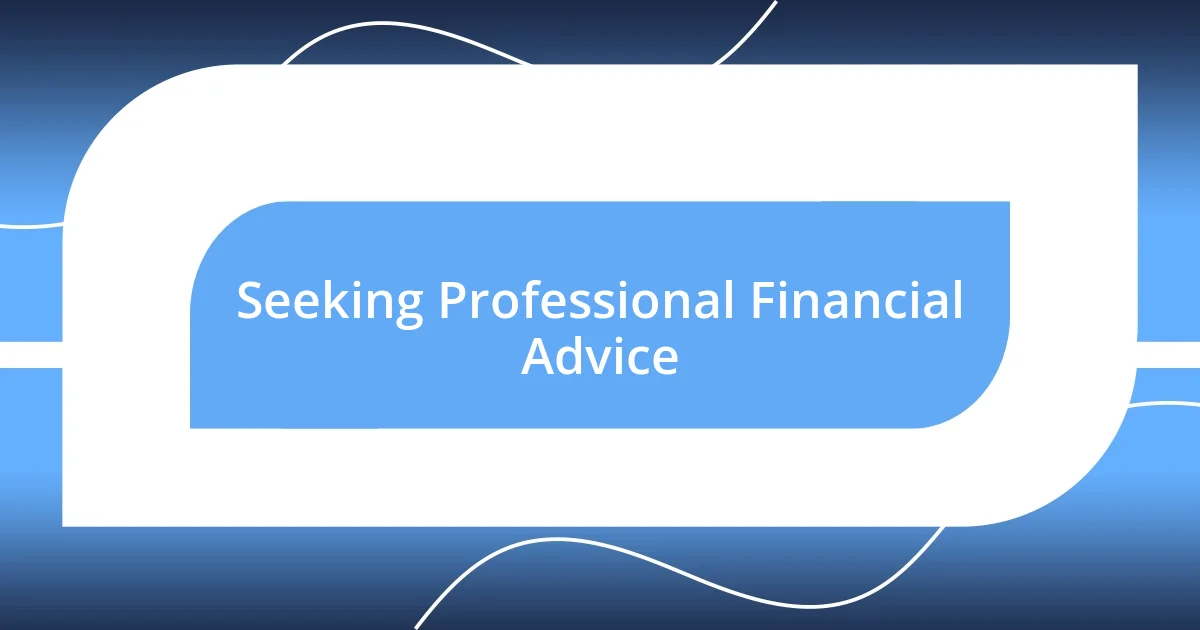
Seeking Professional Financial Advice
When I faced financial setbacks, seeking professional financial advice became a game-changer for me. The first time I met with a financial advisor, it was a bit intimidating. I felt vulnerable talking about my finances, but they created a safe space for me to open up about my fears and goals. Have you ever considered how powerful it feels to have someone guide you through a confusing financial landscape?
Since that first meeting, I’ve appreciated how these professionals offer insights tailored to my situation. They helped me map out a personalized plan that wasn’t just about cutting back on expenses. Instead, it included strategies for investing, debt consolidation, and even taking advantage of tax benefits I hadn’t known about. I always marvel at how a fresh perspective can illuminate solutions I couldn’t see on my own. Do you find that talking to someone knowledgeable opens up new avenues for you?
Over time, I’ve realized that financial advice isn’t just about numbers; it’s about navigating life’s uncertainties. During one of our sessions, my advisor shared a personal story about his own financial hiccups, which made me feel less alone in my struggles. It reinforced the idea that everyone experiences tough times, and having that support is invaluable. Have you thought about how professional guidance could not only help you financially but also offer emotional support during difficult periods?
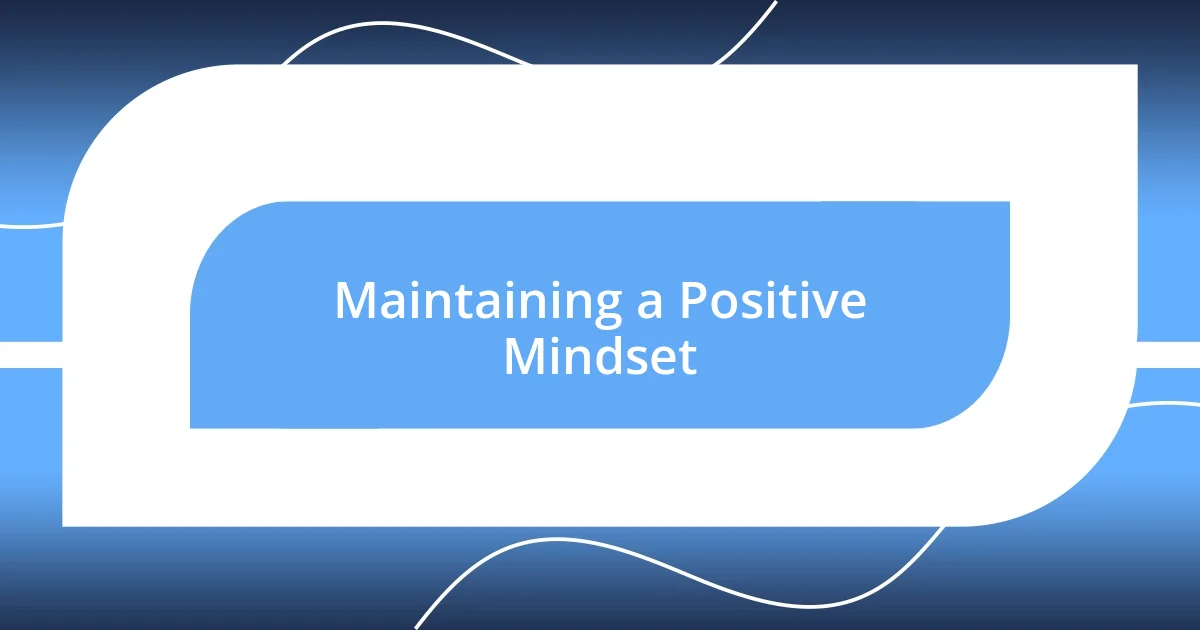
Maintaining a Positive Mindset
Maintaining a positive mindset during financial setbacks can be challenging yet transformative. I recall a period when bills piled up, and I felt overwhelmed. Instead of spiraling into despair, I decided to focus on what I could control, like my attitude. Have you ever tried to shift your perspective in tough times? I found that reminding myself of my resilience and past successes helped me reconnect with hope.
I also practiced gratitude as a tool to maintain positivity. Each day, I made it a habit to jot down three things I was grateful for, no matter how small. This simple exercise had a profound effect on my outlook. It shifted my focus from scarcity to abundance, fostering a mindset that allowed me to see opportunities amid challenges. Have you ever considered how gratitude can reshape your perspective? It truly transformed my approach to setbacks.
In my journey, I learned the power of surrounding myself with positive influences. Whether it was friends who uplifted me or engaging in uplifting online communities, I discovered that sharing my struggles with supportive people helped light the way forward. It inspired me to adopt a more optimistic outlook, reminding me that I wasn’t alone. Have you found a support system that helps you stay grounded during tough financial times? Embracing positivity isn’t just a choice; it’s a lifeline during adversity.












